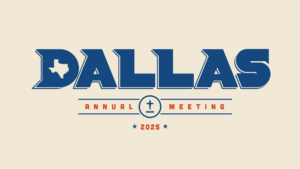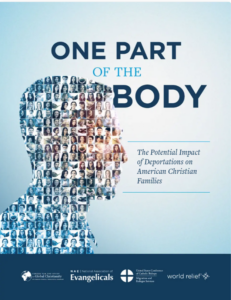
NEWPORT, Tenn. (BP)–In 2006, the election of Frank Page as president of the Southern Baptist Convention sent a signal that the Cooperative Program is still important to Southern Baptists.
Page, who by his own admission thought he never stood a chance of being elected, defeated two more widely known Southern Baptist leaders (Ronnie Floyd and Jerry Sutton) who were pastors of churches that gave a relatively low percentage of undesignated gifts through the Cooperative Program for Southern Baptist national and international missions and ministries. On the other hand, First Baptist Church in Taylors, S.C., where Page was serving at the time, gave 12.4 percent through the CP giving channel the year prior to his election.
Fast forward four years to this year’s SBC annual meeting in Orlando, Fla.
Southern Baptists elected a pastor (Bryant Wright of Georgia) who had led his church to cut back its gifts through the Cooperative Program.
It would appear that Southern Baptists now have sent a message that the Cooperative Program is not as important as it once was. But Page, president-elect of the Executive Committee of the Southern Baptist Convention, does not believe that is the case.
He said his election as SBC president “told me that the Cooperative Program does matter and that many people think it is ‘the glue that holds us together.'”
Page observed that the Cooperative Program, in the last four years, has “received more scrutiny than at any given point in time. I believe that is positive.”
Page, who will assume his new role Oct. 1, shared his views on the Cooperative Program, the Great Commission Resurgence Task Force and other matters during an interview with the Baptist and Reflector in mid-August, during a speaking engagement at a GPS (God’s Plan for Sharing) Summit sponsored by the Tennessee Baptist Convention at Carson Springs Baptist Conference Center in Newport.
GCR REPORT
Page cited another action taken at the meeting in Orlando to support his belief that the Cooperative Program remains important to Southern Baptists.
Page was a member of the Great Commission Resurgence Task Force that brought a report to the convention, after presenting an initial report last February during the meeting of the Executive Committee in Nashville.
Page acknowledged that he struggled with the initial report and was viewed by some on the task force as being negative. “I did express regularly and often my reservations to the task force,” Page said.
After the initial report, Page noted Southern Baptists began to express their opinions and concerns. What’s more, he said, the task force heard those concerns and acted on them.
“Between that initial report and the final report, the task force listened to Southern Baptists and to some on the committee, that made it a far more palatable document for Southern Baptists,” Page said.
Page noted the Cooperative Program “came out as greatly affirmed as the method” of funding Southern Baptist missions and ministry efforts. It was mentioned nine times, he added.
Because of the changes that were made, “I could stand with the committee at the end,” he said.
THE EXECUTIVE COMMITTEE
When the GCR Task Force first presented its report, Page was serving as the North American Mission Board’s vice president of evangelization, a position that he expected to hold for some time.
Prior to the start of the SBC annual meeting, however, Page was elected to lead the SBC Executive Committee, succeeding Morris H. Chapman who retires on Sept. 30.
“Getting a call away from [NAMB] after nine months shocked me,” Page acknowledged.
Although the EC vote was not unanimous, Page is confident the Executive Committee will work with him in the years to come.
“I feel that I will have the support I need from members of the Executive Committee,” he said. “Whether they voted for me or not, they are Christian men and women who know we must move forward together.”
Working together will be imperative as the Executive Committee faces its own challenges as a result of the GCR Task Force report adopted by messengers in June.
One result of the report will be the reduction of 1 percentage point of the Executive Committee’s Cooperative Program allocation in order that the International Mission Board will receive 51 percent of all CP receipts.
The 1 point reduction represents about $2 million, or roughly one-third of the Executive Committee’s budget.
Page acknowledged that the budget reduction will be “extremely tough” for the Executive Committee. He noted, however, that the reduction will not happen immediately.
“The SBC agreed to a vision [when it adopted the GCR Task Force report],” Page said. The implementation of that vision must come through the duly elected bodies of the affected entities (Executive Committee, NAMB and IMB), he said.
“There is going to be a prayerful, considerate deliberation of all the issues,” he said, adding that “nothing will happen quickly.”
CP RESURGENCE
What is needed more than anything for a Great Commission resurgence, Page said, is a “Cooperative Program resurgence.”
“The truth is that the pie [Cooperative Program] has to get bigger,” Page said. In order for that to happen, he said the Executive Committee will work in conjunction with Baptist state conventions to promote the Cooperative Program.
Asked if the Executive Committee would promote “Great Commission giving” — one of the recommendations of the GCR Task Force — Page underscored: “We will celebrate all missions giving, but we will promote the Cooperative Program.”
Page emphasized, however, that “we are not going to beat people over the heads” with the idea that they have to give through the Cooperative Program in order to be a good Southern Baptist.
“We are going to promote the vision of our Lord Jesus — that being the Great Commission — and ask people to come together to support a vision, not a program,” Page said.
Page noted that the culture today is different, in that it is more individualistic, which has drifted down to churches as well.
Churches today have the ability to do missions and many of them are doing and funding their own work, Page said.
“We have to show people that we are part of something bigger than ourselves.
“The Cooperative Program will grow and prosper only when there is Christ-like selflessness. We must be a part of a movement of God beyond our local church’s ability to do missions,” Page said.
He also noted that people in the 21st century want to see value in what they are giving to. “I believe we can do a better job of showing that we can do more together than we can do separately,” he said.
FUTURE OF THE SBC
Page is spending time as president-elect of the Executive Committee learning about relationships, job responsibilities and various intricacies of the SBC. In addition, he is maintaining an extensive speaking schedule.
“The future of the convention is bright,” he said, “but it will be a different convention than it was in the 20th century.”
Missions support will continue to be strong, he said, though not “as traditionally funded” as it once was. The Cooperative Program will be joined by other revenue streams and basically it already is, he acknowledged.
There are “a large number of younger persons coming forward who might not be institutionally loyal but they are loyal to the causes of Christ,” Page said. “If we can show the value of the convention, we can be partners with the younger generation.”
The future of the SBC, Page continued, will include a strong partnership with Baptist state conventions.
“They [the state conventions] are an integral and strong part of the team that will get the vision of implementing the Great Commission accomplished,” he said.
As the GCR Task Force report is implemented, Page acknowledged current agreements between NAMB and the state conventions will phase out, but new agreements will be established.
“State conventions are autonomous and will decide how they can be a part of the vision,” Page said. “We will work together and respect their autonomy.”
The bottom line, Page said, is “how can we do more to reach the massive number of lost people?” It will take “belt-tightening” on the part of all entities, including state conventions, to increase funds going to international missions, he said.
While saying that he has never used the “50-50 language” (state conventions sending 50 percent of all CP receipts to the SBC), he said he has “always encouraged the states where I lived to give more beyond themselves.”
EC/SBC VISION
Acknowledging that the overall vision of the SBC is fulfilling the Great Commission, Page said he is in the process of developing a more succinct vision for the Executive Committee.
He also has a desire to see “a stronger unity among Southern Baptists” than ever before, noting that he is convinced that “our unity affects our evangelism.”
After his election as SBC president, one of Page’s desires was to see a nationwide evangelism strategy.
He took his ideas to NAMB and the result was GPS (God’s Plan for Sharing), a 10-year national strategy to tell everyone in the United States about Jesus Christ.
One year after its launch with about 15,000 churches last year, baptisms increased this year for the first time in many years, Page said.
The 2.2 percent increase in baptisms “was not massive, but any turnaround must start somewhere,” he said.
But for baptisms to continue to increase, Southern Baptists need to show the world something different than what they have shown in the past, he said.
When he has told people that he was a Southern Baptist, people would respond, “Aren’t you always fighting?”
“If we are going to win the world for Christ, then the world needs to see a far more loving, cohesive unity among Southern Baptists,” Page said.
–30–
Lonnie Wilkey is editor of the Baptist and Reflector, newsjournal of the Tennessee Baptist Convention.














